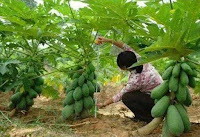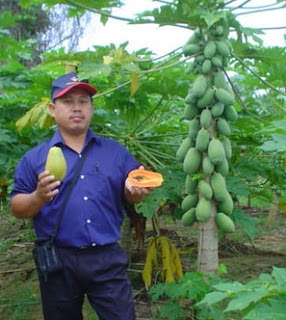PAPAYA (Carica papaya) or locally known as BETIK in Malaysia are grown for domestic and exports market. Johor and Perak are the states mostly grown with papaya with selected varietiea. The main varieties grown were Betik Sekaki, Betik Solo, Betik Eksotika and Betik Subang. The Consumers’ Association of Penang (CAP) is very concerned to learn that papaya trees in Perak and few other states were hit by deadly virus. Farmers suffered losses as the only remedy is to chop down all the trees. It is reported that the Ministry of Agriculture and Agro-Based Industries had offered supplies of papaya seeds as assistance to farmers that were hit by the latest virus attack. Malaysian papaya growers had faced similar problems with virus attacks, recently in Lanchang, Pahang and in 2007 papaya growers in Johor Bahru reported millions of ringgit in losses as trees in their orchards were infected with either the papaya ring spot virus (PRSV) or the papaya die-back virus. In fact the Papaya RingSpot Virus (PRSV )causes the most serious virus disease of papaya worldwide. The PRSV, as reported by the Global Invasive Species Programme, originates in South America and was first detected in Asia in 1975, in Taiwan. It has since spread to most papaya-growing areas in South and South-East Asia, probably through the importation of infected papaya plants. Once introduced, it is transmitted from plant to plant by aphids, which carry the virus in their piercing mouthparts.
 The Agriculture Department should investigate the cause of the latest wide-spread of virus. As there is no cure for this viral disease, farmers were advised to destroy the trees. To avoid any more losses for farmers, measures must be taken to prevent new introductions of PRSV in cultivated areas. One of the answers to the crisis is small scale farming based on traditional and non-chemical methods of production that are both farmer friendly and environment friendly. One of the models for sustainable small-scale agriculture is natural farming that maintains soil productivity after proper rejuvenation of soil health, restoration of its fertility and regeneration of ecological resources. A healthy plant grown in a healthy soil will ultimately be more resistant to pest damage. There is a variety of natural methods to enhance soil and plant health.
The Agriculture Department should investigate the cause of the latest wide-spread of virus. As there is no cure for this viral disease, farmers were advised to destroy the trees. To avoid any more losses for farmers, measures must be taken to prevent new introductions of PRSV in cultivated areas. One of the answers to the crisis is small scale farming based on traditional and non-chemical methods of production that are both farmer friendly and environment friendly. One of the models for sustainable small-scale agriculture is natural farming that maintains soil productivity after proper rejuvenation of soil health, restoration of its fertility and regeneration of ecological resources. A healthy plant grown in a healthy soil will ultimately be more resistant to pest damage. There is a variety of natural methods to enhance soil and plant health. Intercropping, multi-cropping or mixed cropping, as opposed to mono-cropping is a good way to minimize the risks for a farmer. The farmer would also be able to enjoy continuity of yield throughout the year. In case of a crop’s failure, the farmer can rely on the other crops. Papaya growers must avoid planting crops which harbor aphid vectors. Other advantages of intercropping include the limitation of outbreaks of crop pests because some plants act as natural pesticides against other crops’ pests, while rotation protects against endemic pests and the protection of biodiversity. The diversification of crops is decided according to the area and agro-climatic conditions. Sustainable agriculture employing ecological agriculture or natural and organic farming methods is important to deal with the increasing threat from pest attacks and also climate change. This method of non-chemical based farming is essential to ensure the country’s food security and sustainable development. The Malaysian government able to promote and facilitate the adoption of sustainable and lower input agriculture, and environmental friendly technologies and practices. The government cater and provide training, economic instruments and incentives for farmers to switch to sustainable agriculture. Adopted from CAP articles. Thanks.
Intercropping, multi-cropping or mixed cropping, as opposed to mono-cropping is a good way to minimize the risks for a farmer. The farmer would also be able to enjoy continuity of yield throughout the year. In case of a crop’s failure, the farmer can rely on the other crops. Papaya growers must avoid planting crops which harbor aphid vectors. Other advantages of intercropping include the limitation of outbreaks of crop pests because some plants act as natural pesticides against other crops’ pests, while rotation protects against endemic pests and the protection of biodiversity. The diversification of crops is decided according to the area and agro-climatic conditions. Sustainable agriculture employing ecological agriculture or natural and organic farming methods is important to deal with the increasing threat from pest attacks and also climate change. This method of non-chemical based farming is essential to ensure the country’s food security and sustainable development. The Malaysian government able to promote and facilitate the adoption of sustainable and lower input agriculture, and environmental friendly technologies and practices. The government cater and provide training, economic instruments and incentives for farmers to switch to sustainable agriculture. Adopted from CAP articles. Thanks.By,
M Anem,
Senior Agronomist
Papaya Commersial Farms,
KM27, Lenga, Pagoh,
Johor, Malaysia.
(January 2017)


No comments:
Post a Comment